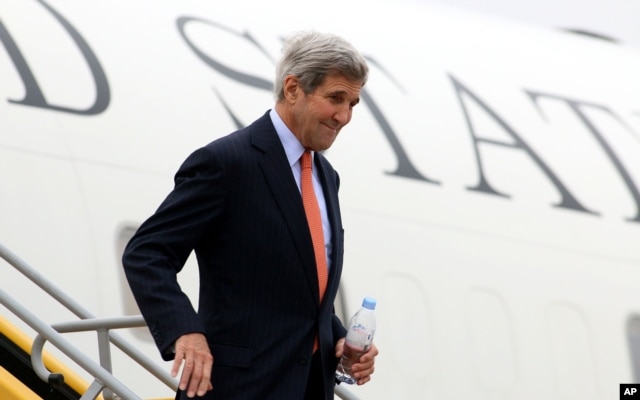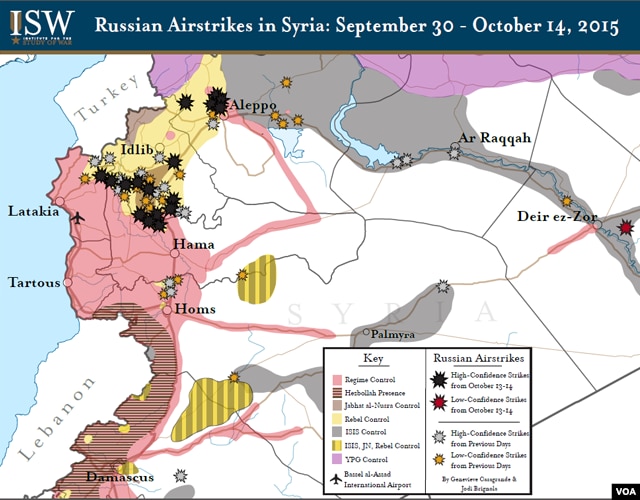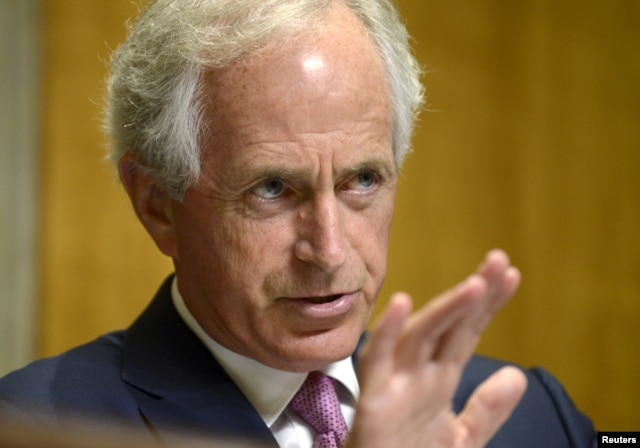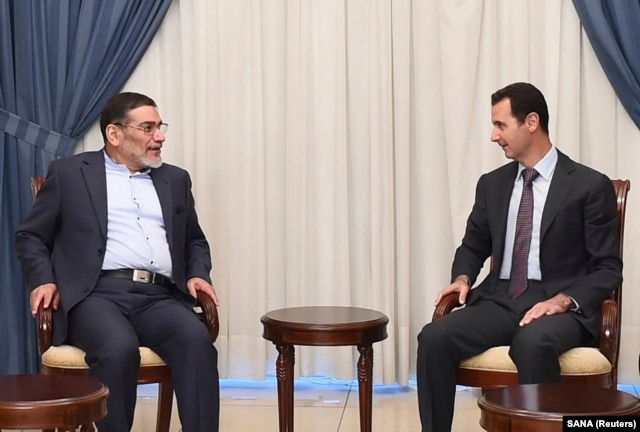Kerry: Vienna Talks Best Chance to End Syria’s ‘Nonstop Horror’

Last updated on: October 29, 2015 10:18 AM
On Friday, the meetings will expand to include representatives from other nations.
The talks notably will not include members of either the Syrian government or the main groups trying to overthrow it.
Syrian National Coalition member Mwafaq Nairabiye warned that Iran would hamper efforts to reach a political resolution because of its support of Assad.
In a Wednesday meeting with a French parliamentary delegation, Assad said that many regional and Western countries, including France, were providing support to armed terrorist groups in Syria.
‘Will not be easy’
Nonetheless, Kerry on Wednesday expressed optimism that the talks appear to be the best way to reach an eventual peace.
«While finding a way forward on Syria will not be easy – it’s not going to be automatic – it is the most promising opportunity for a political opening we have seen,» Kerry said, speaking at the Carnegie Endowment for International Peace.
U.S. Secretary of State John Kerry arrives at Vienna’s Schwechat airport, Austria, Oct. 29, 2015. Kerry has arrived for talks on ending the Syrian war with other key nations, including bitter regional rivals Iran and Saudi Arabia.
Rattling off the statistics – one in 20 Syrians has been wounded or killed, one in five is a refugee – Kerry said: “My friends, the challenge we face in Syria today is nothing less than to chart a course out of hell.”
Kerry, who left for Vienna following the speech, said the U.S. is taking a two-pronged approach to Syria.
One is the diplomatic route, as exemplified by this week’s negotiations.
The second prong is intensifying the counter-Islamic State campaign being conducted by a U.S. led coalition.
Kerry said the coalition will be resupplying moderate fighters in Northern Syria, enhancing its air campaign and beginning to put pressure on Islamic State’s chief city of Raqqa.
US lawmakers skeptical
Earlier Wednesday, U.S. lawmakers questioned the prospects for progress in multinational talks about Syria’s political future, considering the gaps between the U.S. position and the views of Russia and Iran.
“It is hard to square … the facts on the ground with the potential for some grand diplomatic solution,” Senator Bob Corker said during a Capitol Hill hearing on U.S. Middle East strategy.
Corker cited Russia’s continued airstrikes against the Syrian opposition, including some opposition groups that receive U.S. support, as a key reason for his skepticism.
After the hearing, Corker told VOA’s Deewa Service that U.S. and Russian interests in Syria are different because «Russia is killing folks we have been training.»
He added that while the U.S. has seen some “breakthroughs” recently in the fight against Islamic State – such as use of military bases in Turkey – more needed to be done.
“At some point there has got to be a willingness by our Arab friends and others to be much more on the ground,” said Corker. “But that is not where we are in Syria,” he said.
At the Senate hearing, General John Allen told lawmakers the crisis in Syria is one of the most complex situations he has seen in his military career.
Allen is a retired Marine Corps general who is special U.S. envoy assigned to counter the activities of Islamic State militants in Syria and other countries.
Corker asked Allen if the Obama administration could envision a situation in which Russian military units in Syria would focus exclusively on Islamic State targets in Syria, and exclude other Syrian opposition groups from their airstrikes.
Allen replied no, because Russia’s overall goal in Syria is to “stabilize” Assad by fighting the opposition elements that pose the greatest threat to his regime.
In his speech, Kerry said that while the U.S. has big differences with Russia, there also are areas of agreement including a conviction that the status quo is untenable and that Syria can only be saved through a political settlement.
Senator Jeanne Shaheen told VOA’s Deewa Service that she believes the U.S. will continue to work with its partners, including Arab and European partners, to ramp up the fight against Islamic State.
Part of a broader effort
Iran’s foreign ministry said Foreign Minister Mohammad Javad Zarif and three of his deputies will take part in the talks. But there also were fresh signs that Iran and the United States remain far apart on the Syrian issue.
FILE – Syria’s President Bashar al-Assad, right, meets Admiral Ali Shamkhani, Iran’s Supreme National Security Council Director, in Damascus, Sept. 30, 2014.
Iran’s top national security official, Ali Shamkhani, said the U.S. and its allies have been fighting for three years to get the Assad government to surrender.
All the Western powers have achieved in that time, Shamkhani said during a visit to Islamabad, is a refugee crisis, a terrorism crisis and extensive damage to Syria’s infrastructure.
At this point, the Iranian official told reporters in Pakistan: “They have come to the conclusion that the Iranian point is right about seeking a political solution to the problem.”
U.S. diplomats do not expect a definitive conclusion to the talks this week. Instead, they expect there will be further rounds of meetings about Syria’s political future.
Vienna is the first stop for Kerry on a trip that also will take him for the first time to Central Asia – to Bishkek in Kyrgyzstan; Samarkand, Uzbekistan; Astana, Kazakhstan; Dushanbe, Tajikistan; and Ashgabat, Turkmenistan.
Ayaz Gul in Islamabad and a number of VOA reporters contributed to this report.





